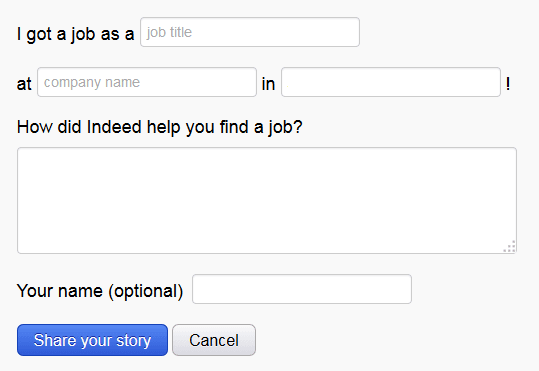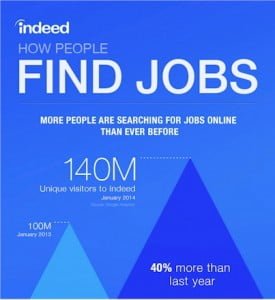Recruiting has changed. In the September 27, 2016 Ask The Headhunter Newsletter, a job applicant responds to a posting and gets a call from the cops.
Is this recruiting?
 Employers are so out of it that they’re not only putting up digital roadblocks against people they’re trying to attract — such as online application forms and video interviews — now they’re hiding in bunkers, barring the doors, and calling the cops on earnest job applicants.
Employers are so out of it that they’re not only putting up digital roadblocks against people they’re trying to attract — such as online application forms and video interviews — now they’re hiding in bunkers, barring the doors, and calling the cops on earnest job applicants.
A reader found this stunning episode on an Indeed discussion forum:
I recently applied to a job on Indeed and sent a follow up e-mail a few days later. About a week passed with no response, and I sent another e-mail, saying I would come by their office. They quickly sent a response saying they no longer had a position available. Twenty minutes later I got a phone call from the police. They complained that I threatened and harassed them. I denied it, and the cop said to not contact them again. The whole thing is almost unbelievable. I hate applying for jobs.
WTF?
Why doesn’t this employer just keep an armed guard posted at the door?
When you find a job posting online, can you get arrested for showing up in person at a company to apply? I’m not a lawyer, and I won’t touch that question, but such conflicted behavior and mixed signals sent by employers reveal just how dysfunctional recruiting has become.
Applying through the front door
More than once, I walked into companies I wanted to work for and gave my resume to a receptionist. Sometimes a manager would come out to talk to me. Or a personnel clerk would appear briefly. When no one appeared, I’d chat up the receptionist, collect some company literature to educate myself, and go home. Worst case, I’d write the employer off. On to the next.
If employers are afraid of who comes in the front door, why are they recruiting? Why are they in business? What if a customer shows up unannounced? Does the sales department send in its dogs?
WTF, indeed. I know many people who have taken the time and trouble to go to an employer’s office to demonstrate how serious they are about getting a job. But recruiters have so dehumanized job applicants they’re trying to attract that they no longer know how to welcome them.
Hiding from the applicants
Employers solicit such staggering numbers of people that they’re are afraid of who appears. The only way to process the incoming rush is to dehumanize and render people into database morsels. (See “How HR optimizes rejection of millions of job applicants.”) And to hide.
 This cannot be reconciled with the idea that an employer is trying to attract you. When you’re an abstraction in a database — a mess of keywords — the assumption is that you’re to be avoided and feared, either as a waste of time or, in this case, as a physical threat.
This cannot be reconciled with the idea that an employer is trying to attract you. When you’re an abstraction in a database — a mess of keywords — the assumption is that you’re to be avoided and feared, either as a waste of time or, in this case, as a physical threat.
Lest someone suggest it’s inappropriate to show up at a company after submitting a resume, keep in mind that at some point you’ll be invited for an interview at a bricks-and-mortar office that has a front door. If the front door is a locked bunker, then the job applicant who posted that story would likely just walk away — probably disgruntled. But if the front door is open for business, then it’s no more inappropriate for a job applicant to show up than it is for a customer to show up to buy something.
Recruiting from the panic room
So what does this incident mean? We must assume the job applicant did nothing wrong or threatening. After all, this person was applying for a job. They want to impress the employer — not hurt anyone — hence the visit to the office. (On the flip side, does a job applicant assume a murderous psychopath has lured them to an interview?)
When an employer worries for its safety or fears who’s going to show up, that tells us there’s something fundamentally wrong with popular methods of recruiting. It’s pretty clear that the fear and worry stem from soliciting teeming hordes of applicants that employers don’t really want. Depersonalizing and demonizing them only adds to the distrust — we naturally fear the unknown.
This incident is perhaps the most stunning evidence that the online employment system companies rely on is inherently twisted and warped. (See “Employment In America: WTF is going on?”) This job seeker’s experience reveals a panic-room mentality, where employers huddle and hide behind locked doors and impenetrable applicant tracking systems. It highlights one recruiting perversion after another:
- Advertise a healthy work environment — but reveal your company’s paranoid culture.
- Proclaim a desire to find great people — but treat applicants like they’re psychopathic marauders.
- Solicit job applicants — then tell them there’s no job.
- Open your company to the talent — then call the cops when the talent arrives.
- Talk about how people are your most important asset — but only let digital profiles and applications in the door.
The problem is not that a company called the cops on a job applicant it attracted. That’s merely a symptom. The problem is that the highly automated recruiting system our economy depends on can’t deal with people.
What kinds of contradictory messages have you gotten from employers? What’s the most bizarre experience you’ve had when applying for an advertised job?
: :


 Reader 1: Back in the 20th century, employers actually reviewed resumes by reading them rather than scanning them into a computerized ranking system. Keywords have turned hiring into a pass-the-buck game, with HR complaining it can’t find talent! Well, HR isn’t looking for talent. HR isn’t looking for anything. Phony algorithms are keeping the talent unemployed while HR gets paid to do something else! The question is, what is HR doing?
Reader 1: Back in the 20th century, employers actually reviewed resumes by reading them rather than scanning them into a computerized ranking system. Keywords have turned hiring into a pass-the-buck game, with HR complaining it can’t find talent! Well, HR isn’t looking for talent. HR isn’t looking for anything. Phony algorithms are keeping the talent unemployed while HR gets paid to do something else! The question is, what is HR doing? Budget problems may impact hiring and internal promotions, but it’s HR’s job to make sure all the i’s are dotted and the t’s are crossed before HR makes offers that impact people’s lives. Don’t make job offers if you don’t have the authority to follow through. If your company doesn’t give you that authority, then quit your job because you look like an idiot for having a job you’re not allowed to do. What happens to every job applicant is on you. (See
Budget problems may impact hiring and internal promotions, but it’s HR’s job to make sure all the i’s are dotted and the t’s are crossed before HR makes offers that impact people’s lives. Don’t make job offers if you don’t have the authority to follow through. If your company doesn’t give you that authority, then quit your job because you look like an idiot for having a job you’re not allowed to do. What happens to every job applicant is on you. (See  The job of recruiting is about identifying and enticing the right candidates for jobs at your company. It’s not about soliciting everyone who has an e-mail address, and then complaining your applicants are unqualified or unskilled. You can’t fish with a bucket.
The job of recruiting is about identifying and enticing the right candidates for jobs at your company. It’s not about soliciting everyone who has an e-mail address, and then complaining your applicants are unqualified or unskilled. You can’t fish with a bucket. I have a standing challenge to anyone in HR: Give me one good reason why you need to know how much money a job applicant is making. No HR worker has ever been able to explain it rationally.
I have a standing challenge to anyone in HR: Give me one good reason why you need to know how much money a job applicant is making. No HR worker has ever been able to explain it rationally. part of the workforce), there’s plenty of talent out there to fill the 5.6 million vacant jobs in America. (See
part of the workforce), there’s plenty of talent out there to fill the 5.6 million vacant jobs in America. (See 



